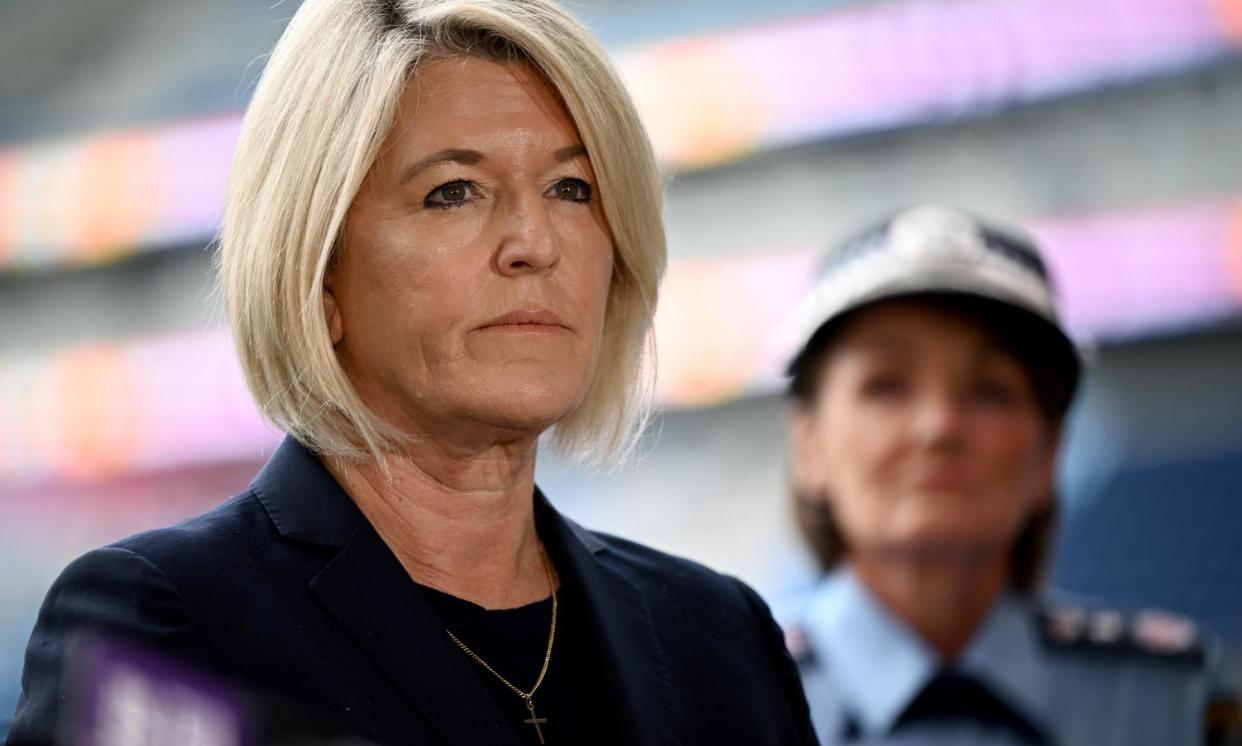NSW police an ‘escalating factor’ in mental health crisis call outs, internal review finds

New South Wales police have admitted that when they attend mental health incidents they are often “an escalating factor” and it would be better if experts were deployed instead.
An internal review conducted by NSW police has called for better resourcing so officers are only involved if a crime has occurred or a person is at immediate risk of serious harm.
A summary of the review, released on Thursday, said officers would be “unlikely” to be able to properly respond to mental health incidents even if they received significantly more training.
The review – conducted after a spate of deaths in NSW – found a majority of incidents NSW police attended didn’t involve criminal offences and/or violence.
Police, on average, attend a mental health incident every nine minutes, the review found, with the number of call outs increasing 10% annually since 2018.
“In a majority of instances where police are deployed, a criminal offence has not been committed and there is no threat of violence or weapon involved,” the review found.
“The involvement of law enforcement is often perceived as a threat, an authoritarian response and an escalating factor.
“Over reliance on police responding to mental health-related incidents can cause distress and increase the risk of injury for both individuals experiencing mental health concerns and police officers.”
The review found police may not be the most appropriate agency to provide support during a mental health or emotional distress incident.
In June, a parliamentary inquiry into the state’s mental health systems urged police to improve mandatory mental health training for officers and “explore” becoming the second responders to these types of emergencies.
Police and the government had been under pressure to enact reforms after the deaths of Clare Nowland, Steve Pampalian, Jesse Deacon and Krista Kach last year.
All four were fatally wounded or shot by police officers while under mental health distress.
Guardian Australia has previously reported that 52 people experiencing mental health distress died during interactions with NSW police between 2018 and 2023.
The police review recommends the state look at responses similar to the “Right Care Right Person” model used in the UK.
It ensures people with health needs are paired with someone with the right skills, training, and experience to meet their needs best.
Advantages of the RCRP model include “engagement by appropriately skilled and trained experts with the knowledge to assess and treat affected persons appropriately”, the review states.
“It reduces stigma associated with a uniformed police response and reduces the need for use of force and restraint by police officers.”
Speaking at budget estimates this week, the state’s mental health minister, Rose Jackson, said the system needed urgent reform but change could not be rushed.
“As we move away from police as the lead responders … there are resource implications to that, there are training implications to that,” she said.
“I don’t want to leave our police, our ambulance and our mental health clinicians with a system change that has not been properly developed, but that development is happening right now.”
A working group between NSW police and NSW Health has been established to examine the review’s findings.
The summary stated that even if officers were given significantly more mental health training, they still would not be as fit to respond as health and ambulance workers. The review dismissed calls for more police training.
“Police are not qualified or trained mental health professionals, nor should they be expected to be,” the review stated.
“Prioritising police training to address de-escalation and threat in circumstances where police attendance is requested is unlikely to adequately address the needs and risk to people experiencing mental health conditions in the community.”
The review assessed current models including the Pacer program.
Under Pacer, mental health clinicians employed by NSW Health are stationed with police to ensure police powers are only used when necessary in responding to mental health crises.
The review found Pacer’s resources were not available 24/7 and had limited capability. It emerged last year that mental health workers were banned from assisting officers during high-risk call outs involving weapons – even on the phone.
The review released on Thursday said proposals to roll out “collaborative partnership initiatives, co-deployment models, mental health clinician triage and guidance, 24/7 mental health phone lines and mental health ambulances” all suffered from the same problem. “The ability to meet demand falls short.”
The NSW police minister, Yasmin Catley, said responding to mental health incidents was a complex issue and it was important people were supported.
The Greens justice spokesperson, Sue Higginson, said the government was “inert and asleep at the wheel” after reading the report which she said had failed to commit to an alternative.
“The government … refuse to respond with the right remedy and urgency required,” she said.
“The families of people who were killed by the police deserve better, and we won’t stop until the government understands this.”


